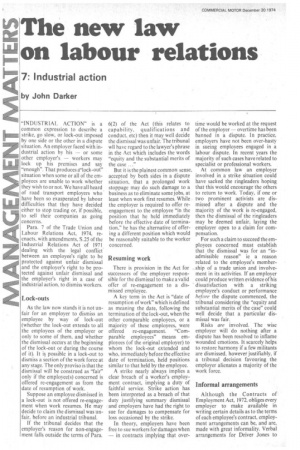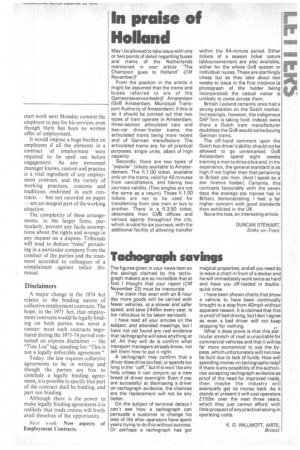The new law on labour relations
Page 38

Page 39

If you've noticed an error in this article please click here to report it so we can fix it.
7: Industrial action
by John Darker
"INDUSTRIAL ACTION" is a common expression to describe a strike, go slow, or lock-out imposed by one side or the other in a dispute situation. An employer faced with industrial action by his — or some other employer's — workers may lock up his premises and say "enough". That produces alock-out" situation when some or all of the employees are unable to work whether they wish to or not. We have all heard of road transport employers who have been so exasperated by labour difficulties that they have decided either to stop trading or, if possible, to sell their companies as going concerns.
Para. 7 of the Trade Union and Labour Relations Act, 1974. reenacts, with amendments, S.25 of the Industrial Relations Act of 1971 dealing with the legal conflict between an employee's right to be protected against unfair dismissal and the employer's right to be protected against unfair dismissal and the employer's right in a case of industrial action, to dismiss workers.
Lock-outs
As the law now stands it is not unfair for an employer to dismiss an employee by way of lock-out (whether the lock-out extends to all the employees of the employer or only to some of them, and whether the dismissal occurs at the beginning of the lock-out or during the course of it). It is possible in a lock-out to dismiss a section of the work force at any stage. The only proviso is that the dismissal will be construed as "fair" only if the employee(s) concerned is offered re-engagement as from the date of resumption of work.
Suppose an employee dismissed in a lock-out is not offered re-engagement when work resumes. He may decide to claim the dismissal was unfair, before an industrial tribunal.
If the tribunal decides that the employer's reason for non-engagement falls outside the terms of Para. 6(2) of the Act (this relates to capability, qualifications and conduct, etc) then it may well decide the dismissal was unfair. The tribunal wil have regard to the lawyer's phrase in the Act which includes the words "equity and the substantial merits of the case ..."
But it is the plainest common; sense, accepted by both sides in a dispute situation, that a prolonged work stoppage may do such damage to a business as to eliminate some jobs, at least when work first resumes. While the employer is required to offer reengagement to the employee "in the position that he held immediately before the effective date of termination," he has the alternative of offering a different position which would be reasonably suitable to the worker concerned.
Resuming work
There is provision in the Act for successors of the employer responsible for the dismissal to make a valid offer of re-engagement to a dismissed employee.
A key term in the Act is "date of resumption of work" which is defined as meaning the date, following the termination of the lock-out, when the other comparable employees, or a majority of these employees, were offered re-engagement. "Comparable employees" means employees (of the original employer) to whom the lock-out extended and who, immediately before the effective date of termination, held positions similar to that held by the employee.
A strike nearly always implies a clear breach of a worker's employment contract, implying a duty of faithful service. Strike action has been interpreted as a breach of that duty justifying summary dismissal and employers have had the right to sue for damages to compensate for loss occasioned by the strike.
In theory, employers have been free to sue workers for damages when — in contracts implying that over time would be worked at the request of the employer — overtime has been banned in a dispute. In practice, employers have not been over-hasty in sueing employees engaged in a labour dispute. In recent years the majority of such cases have related to specialist or professional workers.
At common law an employer involved in a strike situation could have sacked the ringleaders hoping that this would encourage the others to return to work. Today, if one or two prominent activists are dismissed after a dispute and the majority of the work is re-engaged, then the dismissal of the ringleaders may be deemed unfair, laying the employer open to a claim for compensation.
For such a claim to succeed the employees concerned must establish that the dismissal was for an "inadmissible reason" ie a reason related to the employee's membership of a trade union and involvement in its activities. If an employer could produce written evidence of his ' dissatisfaction with a striking employee's conduct or performance before the dispute commenced, the tribunal considering the "equity and substantial merits of the case" could well decide that a particular dismissal was fair.
Risks are involved. The wise employer will do nothing after a dispute has been resolved to inflame wounded emotions. It scarcely helps to restore harmony if a few militants are dismissed, however justifiably, if a tribunal decision favouring the employer alienates a majority of the work force.
Informal arrangements
Although the Contracts of Employment Act, l72, obliges every employer to make available in writing certain details as to the terms of each employee's contract, employment arrangements can be, and are, made with great informality. Verbal arrangements for Driver Jones to
start work next Monday commit the employer to pay for his services, even though there has been no written offer of employment.
It would impose a huge burden on employers if all the elements in a contract of employment were required to be spelt out before engagement. As any personnel manager knows, custom and practice is a vital ingredient of any employment contract, and the variety of working practices, customs and traditions enshrined in such con tracts but not recorded on paper – are an integral part of the working situation.
The complexity of these arrangements, in the larger firms, particularly, prevent any facile assumptions about the rights and wrongs in any inquest on a dispute. Tribunals will tend to deduce "rules" pertaining in a particular company from the conduct of the parties and the treatment accorded to colleagues of a complainant against unfair dismissal.
Disclaimers
A major change in the 1974 Act relates to the binding nature of collective employment contracts. The hope, in the 1971 Act, that employment contracts would be legally binding on both parties was never a runner: most such contracts negotiated during the 1971-74 period contained an express disclaimer — the "Tina Lea" tag, standing for: "This is not a legally enforcible agreement."
Today, the law requires collective agreements to be in writing and though the parties are free to conclude a legally binding agreement, it is possible to specify that part of the contract shall be binding, and part not binding.
Although there is the power to make legally binding agreements it is unlikely that trade unions will freely avail theselves of the opportunity.
Next week: New aspects of Employment Contracts.




















































































